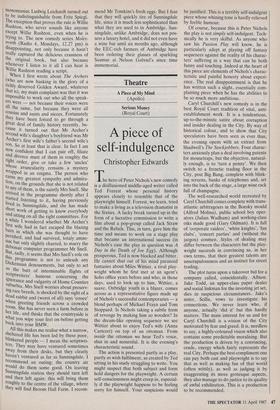Theatre
A Piece of My Mind (Apollo)
Serious Money (Royal Court)
A piece of self-indulgence
Christopher Edwards
he hero of Peter Nichols's new comedy is a disillusioned middle-aged writer called Ted Forrest whose personal history appears closely to resemble that of the playwright himself. Forrest, we learn, tried to make a living as a television dramatist in the Sixties. A lucky break turned up in the form of a lucrative commission to write a film about a pop-group called Jack Straw and the Rebels. This, in turn, gave him the time and means to work on a stage play that became an international success (in Nichols's case the play in question was A Day in the Death of Joe Egg). Although prosperous, Ted is now blocked and bitter. He cannot shut out of his mind paranoid fantasies about Miles Wittier, a rival play- wright whom he first met at an agent's Soho office years before and who, in those days, used to look up to him. Wittier, a suave, Oxbridge youth in a blazer, comes across as a representative figure made up of Nichols's successful contemporaries — a blend perhaps of Michael Frayn and Tom Stoppard. Is Nichols taking a subtle form of revenge by making him so wooden? In the dream-like opening sequence we see Wittier about to enjoy Ted's wife (Anna Carteret) on top of an ottoman. From inside the ottoman we hear Ted's voice, shut in and mournful. It is the evening's characteristic sound.
The action is presented partly as a play, partly as wish fulfilment, as created by Ted sitting in his study struggling to write. You might suspect that both subject and form hold dangers for the playwright. A certain self-consciousness might creep in, especial- ly if the playwright happens to be feeling sorry for himself. Your suspicions would be justified. This is a terribly self-indulgent piece whose whining tone is hardly relieved by feeble humour.
Of course, because this is Peter Nichols the play is not simply self-indulgent. Tech- nically he is very skilful. As anyone who saw his Passion Play will know, he is particularly adept at playing off fantasy sequences against the reality of his charac- ters' suffering in a way that can be both funny and touching. Indeed at the heart of this piece are elements of Nichols's charac- teristic and painful honesty about experi- ence. The real disappointment is that he has written such a slight, essentially com- plaining piece when he has the abilities to be so much more ambitious.
Caryl Churchill's new comedy is in the best Royal Court tradition of vital, anti- establishment work. It is a tendentious, up-to-the-minute satire about corruption and insider dealing in the City. By way of historical colour, and to show that City speculators have been seen as ever thus, the evening opens with an extract from Shadwell's The Stockjobbers. Four charac- ters anxiously plan a deal involving patents for mousetraps, but the objective, natural- ly enough, is to 'turn a penny'. We then switch to a frenetic trading floor in the City, post Big Bang, complete with blink- ing screens, banks of telephones and, set into the back of the stage, a large wine rack full of champagne.
The well-researched world recreated by Caryl Churchill comes complete with trans- atlantic arbitrageurs in the Boesky mould (Alfred Molina), public school boy oper- ators (Julian Wadham) and working-class oiks made good (Gary Oldman). It is full of 'corporate raiders', 'white knights', 'fan clubs', 'concert parties' and (without the jargon) conmen. Styles of dealing may differ between the characters but the play- wright succeeds in convincing us, in her own terms, that their greatest talents are unscrupulousness and an instinct for street trading.
The plot turns upon a takeover bid for a company called, coincidentally. Albion. Jake Todd, an upper-class paper dealer and social linkman for the investing jet set, dies in suspicious circumstances. Jake's sister, Scilla, vows to investigate his connections. We never learn who, if anyone, actually 'did it' but this hardly matters. The main interest for us and for Caryl Churchill is a ,vision of the City motivated by fear and greed. It is, needless to say, a highly-coloured vision which also contains some predictable moralising. But the production is driven by a convincing, crude, energy which fairly represents the real City. Perhaps the best compliment one can pay both cast and playwright is to say that as well as making fun of that world (often wittily), as well as judging it by exaggerating its more grotesque aspects, they also manage to do justice to its quality of awful exhiliration. This is a production to be recommended.
























































 Previous page
Previous page